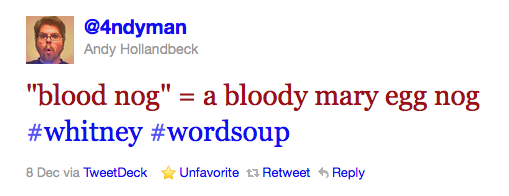We’re celebrating science fiction words and language all week at Wordnik. Today in honor of J. R. R. Tolkien’s birthday, we’re excited to have a guest post from Peter Gilliver, associate editor of the Oxford English Dictionary and author of The Ring of Words: Tolkien and the Oxford English Dictionary.
It is one thing to invent a word and give it life in some specific context; it is quite another to launch it successfully into the mainstream of language. The former is perhaps particularly easy in science fiction and fantasy, where there are new and invented worlds in which new and invented things must be called by their names, but often the exotic nature of the setting ensures that the new name remains confined to its original context. Sometimes a novel concept takes the fancy of other writers, and reappears in their writings under the same name; only rarely does it have enough universal appeal to break out into general circulation, as with H. G. Wells’s time machine and Karel Čapek’s robot (and Isaac Asimov’s robotics).
Perhaps science fiction has the advantage over fantasy here: scientific or technological developments may give reality, or at least real-world meaning, to the originally speculative concept of a science fiction author, whereas the world evoked by a fantasy author is often deliberately removed from reality, its features too intrinsically ‘other’ to be readily transplanted into a non-fantastical context. In our exploration of J. R. R. Tolkien’s distinctive contribution to the lexicon of English, The Ring of Words (2006), I and my co-authors observed how some distinctively Tolkienian words have been taken up by other writers, such as waybread by Ursula Le Guin, or pipeweed by Terry Pratchett. Writers may use one of ‘his’ words when more familiar alternatives are readily available: when Dianna Wynne Jones wrote ‘confusticate Mrs Sharp!’ in Charmed Life, for example, her choice of confusticate rather than confound or bother was surely a tribute (conscious or unconscious) to Tolkien’s use of this rare word in The Hobbit. Such tributes and echoes reflect Tolkien’s pervasive influence.
The names of the creatures of Middle-earth are something of a special case. Some of Tolkien’s distinctive usages in this category have joined the common currency of fantasy: for example, the average fantasy reader (or writer, or role-player) would know what a barrow-wight was even in a non-Tolkienian context. This is not, in fact, Tolkien’s coinage—barrow-wights are to be found in the writings of William Morris and Andrew Lang—but he certainly brought it to a wider public.
Several others of his creatures owe their names to Tolkien’s characteristic philological tendency: that of imagining what role an obsolete or cognate word would have had if it were still in use in modern English. Knowing, for example, that ent had been an Old English word for some (unspecified) kind of giant, Tolkien found it a handy name for the particular kind of tree-giant that he found himself writing about in The Lord of the Rings. Similarly, when he needed a name for a particularly evil and powerful kind of wolf, he could draw on Old Norse (in which the word vargr meant both ‘outlaw’ and ‘wolf’) and Middle High German (in which the related warc was a kind of monster) to come up with warg.
And then, of course, there is orc: a word of uncertain origins which by the nineteenth century—insofar as it survived at all—was simply one of many scarcely-differentiated words for nasty creatures, used to pad out lists such as that in Charles Kingsley’s historical novel Hereward: ‘things unspeakable,—dragons, giants, rocs, orcs, witch-whales, griffins, chimeras, [etc.]’. Tolkien needed a word for a particular kind of goblin-like creature, and he wasn’t happy with hobgoblin, imp, kobold, or with goblin itself. He settled instead on orc, both for what he called ‘its phonetic suitability’ and for its connection with Old English orc ‘demon’, and also adapted the word for his invented Elvish languages. The concept developed in his imagination over the decades to provide the archetypal bad guys of Middle-earth, not to mention many other fantasy milieux.
Arguably even more significant, however, than all the creatures which Tolkien added to the bestiarium of fantasy—including Balrogs, Woses, wraiths, and many others, not to mention hobbit, perhaps the most successful of all—is the effect his writings have had on two of the most important pre-existing creature-names: dwarf and, especially, elf. Tolkien’s dwarves draw heavily on Northern legend and so are perhaps not especially innovative, but they are more thoroughly characterized than most of their predecessors. He even managed to bring about a shift in spelling: dwarves, the plural form that he preferred, is now more common when referring to these creatures (though dwarfs persists in other contexts, such as astronomy).
Tolkien also played a major part in the radical transformation of the meaning of elf. The earliest elves mentioned in English texts were supernatural beings with fearsome powers, which they most commonly used for evil purposes; but by the time of Shakespeare they had declined in fearsomeness—and indeed in size—to diminutive, whimsical creatures, little different from fairies. Tolkien was unhappy with this diminished conception, and to the ‘faery’ people of his poems and legends—something like humans, but somehow greater, more ‘high’—after experimenting with various other words (including fairy) he gave the name elf, and the word has never been the same since.
